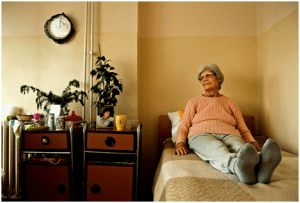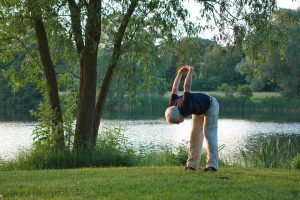Guest Blog: Should We Be Saving for Our Care in Old Age?
‘Carpe diem’ is a phrase that you’ve no doubt heard before. Your grandchildren might be announcing instead that ‘YOLO – you only live once’. The message is simple – live each day as though it’s your last, you never know what’s around the corner. According to those phrases, saving for old age might be a waste of money. We never know if we’ll make it to retirement, or how far into our retirement years we’ll get. Aren’t there more important things to be spending our money on than our old age care? Should we be saving at all?
What are your future prospects?
As much as you might convince yourself that you never know what lies ahead, the reality is that you can assume that you’ll live to see old age. Thanks to medical advances, more and more people are living full and healthy lives past an age that would previously have been considered to be ‘old’. After those healthy years, in many cases, come the not-so-healthy years when medical costs and care costs increase.
If you’re trying to convince yourself that saving isn’t worthwhile because you might not ever be ‘old’, bear in mind that by 2030 it is expected that 1 person out of 5 in the U.S. will be 65 or over.
Should you save for old age?
Your future is unknown. A majority of people pay a small fortune in costs for their care when they reach old age. The amount of support available could increase by the time you’re there, or it could dramatically decrease. It is far better to assume the latter and be prepared for every eventuality than to assume that you’ll have financial support and then discover later on that you don’t.
As you age, you may become less able to earn money and may be less capable of making your own decisions. If you don’t prepare in advance, then the eventual burden of your old age care will fall to your loved ones. By saving for old age, you are able to ensure that you get the best place to live, the best support and the best medical treatment, without impacting on the finances and livelihoods of younger family members.
Ecuva is an online health and wellness store where customers can purchase daily living aids, disability aids and items that can make old age easier, more comfortable and more independent.
Five tips for Grandparents to stay connected with family
With the birth of my daughter’s second child, I began to reflect on the important role that grandparents can play in the lives of their grandchildren. Here are five essential tips for older adults who want to have a lasting influence in the lives of their children and grandchildren.
Visit often. For those of us fortunate enough to live near our children and grandchildren, it is easy to see them often. Grandparents may even be the caregivers while parents are working. Visits don’t always have to be planned. Sometimes the best family time is a spontaneous invitation to dinner and a movie. However, sometimes distance can prevent regular visits. Some grandparents make it a goal to see their distant grandchildren once every 6 weeks or every few months. Be sure to take advantage of technology for your time together. Set a regular time to Skype or do Face-time. Don’t miss out on the subtle changes in those early years while babies are growing. Exchanging pictures may help, but they don’t replace the in-person experience. You may even think of relocating to be closer to family. For older grandchildren, be sure to have their cellphone number. Text them often and exchange pictures to stay involved in their lives and let them know you are available to them. Even small connections throughout the week (but without being annoying to teenagers of course) can make a difference in your relationship with your grandchildren.
Offer to help in practical ways. Working parents with young children will need a break at times. Ask how you can best help. Offer to keep the children for an overnight while mom and dad have a special dinner or weekend getaway. Many grandparents like to take their grandchildren on trips without the parents. Places like amusement parks, the zoo, or day trips to the water park or national forest all provide good diversion and quality time with Grandma and Grandpa while giving parents a rest. For even more quality time, take the older grandchildren on a cruise, camping in the mountains, or to a resort without their parents. For the mom with a newborn, take meals to the house (if you live close), do her grocery shopping or laundry, or send her a new bathrobe to show you are thinking of her. A favorite role model of mine sends the grandchildren a “baby shower in a box” with all sorts of goodies when she can’t be present due to distance or health concerns.
Plan special activities. Special activities need not be expensive. This could mean a trip to the park with Grandma or a special morning walk each week with Grandpa. My father used to take every grandson on a bow-hunting trip when they turned 12 years old. This was a rite of passage for every boy in the family. Grandpa would mount their first deer head for them and buy them a special hunting knife to commemorate the occasion. The girls in the family would take a trip to a Disney resort while the men were hunting. Grandchildren remember these events forever.
Attend special events. How fortunate are the kids whose grandparents are able to attend basketball and volleyball games, swimming tournaments, and Grandparent’s Day at school! Take advantage of being able to attend those dance recitals and school plays. If you live far, plan your visits to be able to attend some significant events like graduations, wedding showers, or school performances. This makes lasting memories with your family.
Be a constant in their lives. My parents divorced when I was 9 years old, and my paternal grandparents were the one constant in my life at that time. When a child’s world is jolted by change, grandparents can be that steadying influence that doesn’t change. They provide stability and security in an unsteady world for a child. The most important thing to remember is to be there. You don’t have to be the all-star parent or grandparent, but your children will remember that you were there for them when it counted the most.
Guest Blog: Take Care Of Your Health Mentally And Physically While Working At Home With These 7 Tips
When working at home, it’s easy to neglect your physical and mental health. You have little access to the gym, and even biohacking your wellness is barely possible. If you want to continue being productive, optimizing your work from home activities can help maximize your wellness.
Working from home can be the root of all kinds of health issues if you don’t have enough discipline. Here are x tips you can do to take care of your physical and mental health.
1. Eat Healthy Meals
Eating healthy isn’t hard, but not many people know where to start. It’s all about planning and having fresh ingredients ready, and knowing what to prepare. Eating healthy is not simply salads, veggie smoothies, and icky stuff. You can incorporate your favorite meals while being healthy.
The fridge and the pantry are your best friends. Prepare yummy, locally-based meals made with locally sourced meats, veggies, and fruits. Meal prep is the key if you think you don’t have enough time.
A simple way to eat healthier is to plan your meals and cook yourself. Batch cooking can also save you a lot of time and give you quick access to something when you’re feeling peckish. Try keeping your fridge and cupboards stocked with healthy foods. Eat your favorites in moderation to help control your weight.
2. Take Frequent Breaks
Let’s be honest: working from home can be rewarding and frustrating. Sometimes, you get stuck and can’t move forward until you reach that brick wall. When you come to this point, take a step back and take a break.
Whatever you do, don’t sit at your desk for hours. Take short breaks every hour or follow the 20-20-20 rule, where you look 20 feet away for 20 seconds every 20 minutes of screen time. This will help relieve the tiredness of your eyes after long hours of working.
When you take regular, quick 5-minute walks, you’ll feel more energized and productive. Every 30 minutes, get up and move around. Stretch your legs and get some circulation on your legs to prevent atrophy and having fat develop on your belly.
3. Exercise, Exercise, Exercise
Physical fitness plays a huge role in your productivity. If you stay fit, you’ll have more energy, sleep more soundly, and be more productive.
You can’t just lie in bed all day and expect to lose weight or improve your overall health. You need to exercise and stick to it. You’re probably thinking, “But I don’t go to the gym.” You don’t need to leave the house to exercise.
Find an exercise that you can do daily. Maybe it’s yoga, weightlifting, or stretching. If you hate going to the gym, then do it in the comfort of your own home. There are a ton of YouTube workouts you can do without leaving the house.
You can easily do strength training, cardio, or yoga if you have a home workout room. You can always use bodyweight exercises or resistance bands if your home doesn’t. Do heavy chores if you have to, just to get good cardio.
4. Go Outside
When you work inside, you get less exposure to sunlight. This causes vitamin D deficiency, which can cause many health problems. Lack of vitamin D causes depression, fatigue, muscle pain, and seasonal affective disorder.
Your mind and body need fresh air. If you live in the city, there are endless options of where to get some fresh air. You can take a walk in your neighborhood and breathe in some much-needed oxygen.
When you go outdoors, you improve your mood, sleep better, and have more energy. Go outside and take a walk. Take a break and go to the nearest park; it’s even better if you’re near a lake or beach. Go to the beach, swim, then relax under the sun.
If you work in an isolated area, turn your home office into a mini garden. Plant some herbs and vegetables, flowers, or even trees.
5. Find a Hobby
Hobbies are not simple pastimes but rather a way to release your creativity. If you don’t find a hobby that brings you joy, you may become depressed, especially if you don’t use it as an outlet for your stress.
Having hobbies helps you relax and reduce stress. Hobbies are a way to unwind and recharge after a long workday. It can be anything that stimulates your mind. It can be anything, from writing short stories to working on your art.
Choose something that you like. If you love writing, start a blog, start writing early in the morning, and finish your articles before working. If you like photography, join a local group. Join a book club, anime club, or volunteer organization. And if you’re a gamer, join a guild and chat with other players.
6. Meditate and Practice Mindfulness
Meditation and mindfulness are not just ways to relax but also ways to practice self-control. These practices can lower your stress levels and keep you focused. Meditation clears your head and lets you focus on your breathing and the current moment, helping mitigate anxiety and give you a sense of well-being.
If you’re new to meditation and start building a habit of doing it, start with 10 to 15-minute sessions. Gradually increase your meditation time and increase the length of each session. You can meditate anywhere, even in your office or bedroom.
Start meditating before you go to bed. This will prevent you from tossing and turning and trying to fall asleep. Meditating will calm you down and help you have a peaceful night of undisturbed rest.
7. Get Enough Sleep
When you don’t get quality sleep at night, your brain won’t be functioning at its total capacity. It can cause fatigue and affect your mood and behavior. When you sleep well, you wake up refreshed and ready to face the day the following day. If you’re awake for 18 hours straight, it’s almost the same as being up for 24.
Your quality of shut-eye affects your mental health. It prevents you from getting happy or sad because of whatever happened the previous day. You can think clearly and make better decisions.
Get 7 to 9 hours of sleep every night. If you have a hard time falling asleep, try taking a warm shower, drinking some chamomile tea, or doing light stretches.
The Bottom Line
When you work from home, the quality of your work matters. When you take care of your health, you become more productive, allowing you to focus more on your work. It’s easy to forget how you have to take care of yourself.
time to exercise or eat right, you become more energetic and happier. You’ll be more creative and have excellent decision-making skills. Good health means a better drive to reach your goals.
You don’t want your physical or mental health to get in the way of your productivity and success. Apply these tips and stay healthy while maximizing your time and energy at home.
Guest Blog: 5 Signs of Mental Health Issues for Seniors

When you’ve started to notice changes in an elderly relative, you may wonder if a mental health issue is the cause. While it is important a mental health professional diagnoses these issues, some signs exist indicating that the time has come to make an appointment.
Depression
Depression can occur for a host of reasons. Elderly individuals may be suffering from the loss of a loved one, or they may feel alienated, isolated or otherwise separated from their friends or from their interests outside of the house. Individuals who seem filled with sadness and negative emotions or who are hinting about emotional turmoil may need outpatient or inpatient treatment for depression.
Anxiety Issues/Bipolar Disorder
You may also notice that your loved ones are having heightened periods of elevation followed by periods of deep sadness. They could be suffering from bipolar disorder. Serious anxieties could begin to manifest at this age too. For example, you may notice that your elderly relatives always seem to be thinking about their own death or about expected loss of other loved ones.
Memory Loss
As people age, you may think that it is a normal occurrence for them to forget information that they would have once remembered. However, these early slips could be signs of a more serious problem that is coming into fruition. Your loved ones might now be forgetting about certain dates or social events, but these struggles could turn into failures to take medication or complete other necessary medical tasks.
Personal Care
If you notice that your loved ones are not taking care of themselves as they used to, this situation could also be a sign of mental health issues. For example, you may have noticed that your relatives are no longer brushing their teeth or bathing on a regular basis. Seeking professional help can uncover the root of the issue so that a plan of treatment can be devised.
Social Withdrawal
Your loved ones might also seem to not want to participate in social activities anymore. Whether they are constantly declining invites to attend family functions or they do not want to participate in community activities any longer, these decisions could be signs that a mental health issue is present.
As your loved ones age, you may be the lookout for physical health issues. While addressing these problems is imperative, so is watching for signs of mental health struggles. May is mental health awareness month, get involved to help bring awareness to this important cause!
Guest Blog: Technological Solutions That Assist the Elderly
 According to the Census Bureau, as of 2011, seniors make up 13.3 percent of the U.S. population. By 2060, seniors are expected to account for at least 20 percent of the population. For many centuries now, the needs of seniors have been taken care of accordingly.
According to the Census Bureau, as of 2011, seniors make up 13.3 percent of the U.S. population. By 2060, seniors are expected to account for at least 20 percent of the population. For many centuries now, the needs of seniors have been taken care of accordingly.
They have doctors who look after them and a caregiver, nurse, or family member who helps ensure they can move around comfortably. However, seniors today are aging at the best time. Thanks to continued advancements in technology, staying healthier and more independent has never been easier.
Fortunately, technology help for seniors nowadays has never been better. For starters, the elderly now have access to a vast range of inspired and practical gadgets that are designed to meet their ever-evolving medical and emotional needs.
Fascinating Technological Solutions for the Elderly
Below are some of the fantastic technological innovations that have helped seniors live fulfilling, happier, and more active lives:
Intuition Robotics
Founded in 2016, this company aims to help older adults avoid feelings of social isolation and loneliness—issues that have been known to contribute to poor health. Their debut product is a robot called ElliQ, hailed as a “sidekick for happier aging.”
ElliQ is designed to initiate conversations that can help seniors engage in healthy behaviors (i.e., nudges to take medications), stay in touch with their friends and loved ones, and stay connected with the outside world.
ElliQ can also check the weather and can determine if it’s conducive for a walk. Loved ones and friends can also interact with ElliQ and can send photos through the app. The pre-order cost for the product is at $1,500 and the monthly fee is set at $30.
Neuro Rehab VR
Neuro Rehab VR was founded in 2017. Their primary goal is to provide a virtual reality experience for elderly patients that are undergoing physical therapy following a brain or spinal cord injury, stroke, and other degenerative diseases.
What makes the VR experience even more phenomenal is how targeted the technology is. By using machine learning, they tailor exercises based on the patient’s specific ability and therapy needs.
The bespoke virtual therapy exercises also record kinematic and physiological responses and quantify the patient’s progress with scores and metrics. Patients are also transported to a virtual world that covers a vast range of situations.
VitalTech
a cloud-based platform that specializes in patient wellness and health through connected care. Their latest offering, VitalBand, was launched in June of 2018. VitalBand is an emergency fall-detection and call-out watch.
VitalBand is also used to track vital signs like oxygen saturation, respiratory and heart rate, physical activity, and sleep quality. It also provides users with medication reminders.
If a fall is detected, an alert goes to a certified call center to dispatch emergency services. If the senior prefers that a loved one is notified first, the fall alert can be sent to up to five preconfigured family members through email or text.
Conclusion
With so many breakthrough technological innovations now designed to help the elderly, they can now look forward to a future where they can enjoy healthier, happier, and longer lives.
About the Author
Melissa Andrews is the Content Marketing Strategist for Paradise Living Centers, an assisted living center for seniors with locations in Paradise Valley and Phoenix, Arizona. In her spare time, she enjoys cooking and going on hiking trips with her siblings and cousins.
Guest Blog: 5 Simple Ways for Seniors to Combat Hip Pain
Almost one-fourth (23.9 percent) of seniors between the ages of 60 and 90 suffer from frequent hip pain.
Whether it’s the result of a bad fall or is brought on by a combination of poor mechanics and old age, it’s important for seniors to know that they’re not doomed to suffer from hip pain for the rest of their lives.
Read on to learn some simple tips to help seniors combat hip pain.
1. Do Hip Bridges
A hip bridge is one of the best exercises you can do to combat hip pain.
To do this exercise, simply lie on your back with your feet hip-distance apart and planted on the ground. Press into the ground and lift your hips in the air, trying to form a straight line from your shoulders to your knees (don’t arch your back).
Hold for 3-5 seconds, then return to the beginning. Complete ten repetitions.
2. Use Ice Daily
Icing your hip can work wonders for relieving pain and inflammation, especially if your hip pain is brought on by bursitis or arthritis. Depending on your pain level, you can ice your hip up to 4-5 times per day in 10-15-minute increments.
3. Raise the Seat
Many seniors find that their hip pain is aggravated when they try to lower themselves onto and raise themselves up from a chair, sofa, or even a toilet. Devices like a chairlift or a raised toilet seat can help reduce hip strain for seniors as they stand up and sit down.
4. Stretch Consistently
Consistent stretching is also important for relieving pain and improving hip mobility. The figure 4 stretch is one of the best for hip pain.
Start by lying on your back with your knees bent. Lift the leg that’s bothering you and cross it over your other leg so that your ankle is resting on your opposite thigh. Pull the bent leg in toward your chest, clasping your hands around the back of your thigh if possible. Hold for 10-15 seconds, then release and switch sides.
5. Use Natural Anti-Inflammatories
Finally, instead of using over-the-counter anti-inflammatories, which can cause serious issues for seniors, try using a natural anti-inflammatory like curcumin (found in turmeric). Turmeric is safe for most people, and research shows it works just as well as ibuprofen for improving joint pain and function.





